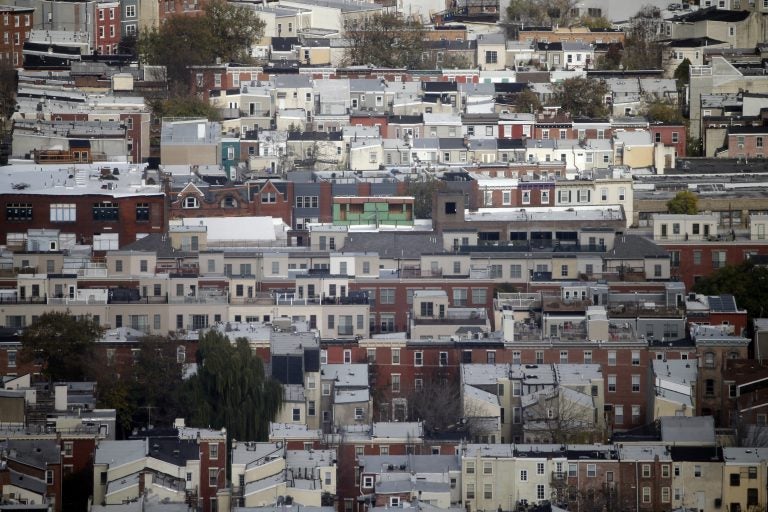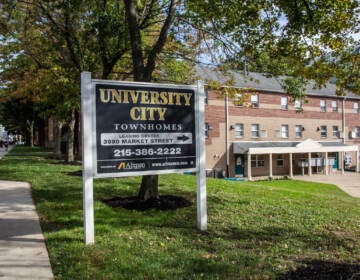Why doesn’t Philadelphia have rent control like many other big cities?
We used to have it — and housing advocates are pushing for a return.

File photo: Philadelphia rowhouses. (Matt Rourke/AP Photo)
This story originally appeared on Billy Penn.
—
Lifelong Philadelphian Mary Hutchins hasn’t spent much time outside the city. Her longest departure was when she visited her daughter last year in Houston, Texas.
Just shy of a half-year, her trip was long enough to get some perspective on Philly’s rapidly rising housing costs. When she returned and began to look for a new apartment, she realized she couldn’t afford any of the available options.
“Apartments are starting at like $1,100,” said Hutchins, a 67-year-old retired administrative assistant. “A lot of rents are just astronomical.”
The high costs got Hutchins thinking, and she submitted this question via Broke is Listening: Why doesn’t Philly have a form of rent control?
As part of the Broke in Philly collaborative, Billy Penn has been reporting on issues around economic mobility in the city. In a new series, we’re going deeper by asking the community what they want us to investigate. For this installment, we’ll explain Philly’s position on rent control.
Can we get some damn rent control in Philadelphia because the otlrice of living is going up 30%‼️ https://t.co/bc0x9HLj2i
— _lataye_ (@lataye6) March 4, 2019
Even if Philadelphia had rent control, it wouldn’t have helped someone in Hutchins’ position. Rent control is a cap on how much a landlord can charge current tenants. It does not apply to people moving into a new place.
Under a rent control system, government gives landlords some kind of defined ceiling, a percentage increase or number they can’t go above when determining the cost of rent. At its best, the policy can prevent displacement and help longterm, low-income residents stay in their homes. The downside, some say, is that it has the potential to disrupt an entire housing market.
Nationally, there’s an ongoing debate about rent control. It’s been around in some U.S. cities for decades — and there’s a local campaign to bring it here, too.
Did Philadelphia ever have rent control?
Though legislators haven’t made rent control a priority in recent years, it’s existed in Philadelphia before. Back in the 1950s, it was a popular federal policy.
In the World War II era, there were federally mandated rent control laws that applied to Philly. When that policy waned, local officials brought it back — until it was struck down by the Pennsylvania Supreme Court in 1955.
“This disinvestment was starting to happen,” said David Thompson, organizer with the Philly Tenants Union. “The state and federal government were actively pulling out funds from cities.”
Since then, Philly hasn’t fought to bring back rent control. But the policy’s been retained in cities like New York and San Francisco. Just a month ago Oregon passed its own rent control law, and now Massachusetts is considering it too.
Will Philadelphia follow suit? Short answer: Probably not.
Is rent control likely to return to Philly?
Philadelphia’s recently released Housing Action Plan did not recommend rent control as a solution to rising housing costs.
Instead, it landed on a shallow rent subsidy, per city spokesperson Paul Chrystie, which provides residents with some help on their rent, rather than capping what an independent landlord can charge. That initiative scored funding in Kenney’s budget for fiscal year 2019.
That doesn’t mean the push is over. Having won the battle for Good Cause eviction legislation, the Philly Tenants Union is now refocusing its efforts on winning rent control for the city. In the runup to the primary election, reps plan to survey Council candidates and get their stance.
“We’ve been trying to go to basically confront candidates running for office and put them on the spot,” Thompson said. “Are they on the side of big developers and landlords, or renters, who make up half of Philadelphians now?”
So far, many of the Democrats running for an at-large Council seat have reportedly expressed approval for the policy.
Every Democrat running for Philly City Council at large at #PeoplesForum at large comes out in support of citywide rent control! pic.twitter.com/THZ15hH5Av
— Anlin Wang (@AnlinWang) March 24, 2019
The Tenants Union plans to announce its official campaign for rent control with an event in the next few weeks, per Thompson. From the activist group’s perspective, the policy’s effectiveness isn’t up for debate.
“There’s no excuse to not get behind real, tough rent control for people,” Thompson said.
The pros and cons
Housing policy experts, on the other hand, say the research on its effectiveness is mixed. Studies say rent control is good for some things — keeping longterm city residents in their homes, for example — but it can be problematic in other ways.
There’s strong evidence out of New York City and California that rent control reliably lengthens the time that tenants stay in rental units. It protects low-income renters from market rate increases — a benefit that shouldn’t be understated.
But drawbacks can ripple throughout the rest of the city. If you lock in an artificial rent for decades at a time, the landlord might not make enough money to cover their operating costs, or to reinvest in repairing the building.
It also puts pressure on housing costs in the rest of the city — rent control usually depresses new construction, and unregulated housing costs tend to go up.
“It’s likely to be harder for aspiring residents of the city, whether they’re immigrants or domestic migrants, to find affordable housing,” said Charles McNally, communications director for the NYU Furman Center. “It sort of subsidizes existing residents, potentially at the expense of future residents.”
In the midst of a national conversation about rent control, McNally encouraged cities to implement not just one policy — but a robust plan that protects residents from displacement, establishes new affordable housing options and encourages market-rate development.
“There’s no silver bullet, there’s no one policy that can do it,” he said. “You really need a comprehensive, balanced housing plan.”
 Billy Penn is one of more than 20 news organizations producing Broke in Philly, a collaborative reporting project on economic mobility. Read more at brokeinphilly.org or follow at @BrokeInPhilly.
Billy Penn is one of more than 20 news organizations producing Broke in Philly, a collaborative reporting project on economic mobility. Read more at brokeinphilly.org or follow at @BrokeInPhilly.
WHYY is your source for fact-based, in-depth journalism and information. As a nonprofit organization, we rely on financial support from readers like you. Please give today.




